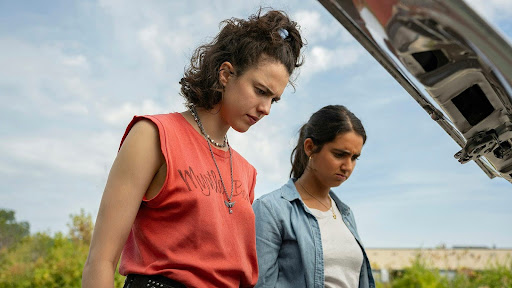‘Drive-Away Dolls’ Is a Bawdy, Delightful Queer Crime Comedy From Ethan Coen

John Maescher ‘27 / Emertainment Monthly Staff Writer
For the past four decades, the Coen brothers have established themselves making a wide variety of films in several different genres, but their zany crime comedies like Raising Arizona, Burn After Reading, and The Big Lebowski have proven to be among their most beloved films. The brothers have drifted apart and branched out in recent years; Joel Coen partnered with his wife and longtime collaborator Frances McDormand for The Tragedy of Macbeth in 2021, and now Ethan Coen has teamed up with his wife, co-writer, and editor Tricia Cooke for Drive-Away Dolls, a queer screwball road-trip comedy that hearkens back to the Coens’ wackier works. It’s the lightest, goofiest entry in the Coen oeuvre yet, but don’t let anyone tell you this is a minor or forgettable effort. Drive-Away Dolls is every bit as hilarious and delightful as any of the Coens’ other comedies—and also considerably raunchier, delivering some of the most gleefully vulgar and ribald humor to grace the silver screen in recent memory, and echoing the unapologetically crude B-movies of Russ Meyer and John Waters.
The film begins in Philadelphia in 1999, with Y2K and an election cycle looming in the distance. Marian (Geraldine Viswanathan) is an introverted, sapphic bookworm who wants to get away to Tallahassee for a birding excursion with her aunt. Her best friend Jamie (Margaret Qualley) is the exact opposite in personality—a free-spirited, sexed-up livewire who jumps at the chance to join Marian just for an opportunity to live it up on the road. Together, they embark in a rented car from shady drive-away dealer Curlie (Bill Camp) for a one-way ticket to Tallahassee. However, Jamie and Marian just happen to choose a car that was meant for an inept pair of criminals—chatterbox Arliss (Joey Slotnick) and hothead Flint (C.J. Wilson)—who set off on Jamie and Marian’s tail in desperate pursuit of a briefcase in the car’s trunk. What’s inside the briefcase would be a crime to reveal, but it’s funnier than anything you could possibly guess. Along the road, Jamie and Marian get into various misadventures as Jamie tries to loosen Marian up, their journey marked by motel hookups, lesbian bar visits, and a digression with a women’s soccer team. Other colorful characters peppering this madcap journey include a conservative senator (Matt Damon) with an important connection to the briefcase, a smooth crime boss (Colman Domingo) who stays one step ahead of the criminals and their pursuit of the girls, and Jamie’s cop ex-girlfriend (Beanie Feldstein) who also gets tangled up in the screwball antics.
For those lamenting the absence of the other Coen brother, Drive-Away Dolls showcases an inspired creative pairing all the same with Coen and Cooke. Cooke has served as editor on several of the brothers’ films, but her involvement as co-writer gives Drive-Away Dolls a personal perspective. Cooke is a queer woman who based much of the film on her own experiences in lesbian bars; her marriage to Coen is “nontraditional” as they’ve described it, an open relationship where each has their own separate partner. In an interview with the Associated Press, Cooke explains that she “kind of represent[s] the queer world…All of the bumbling men in the movie and all of the caper stuff definitely comes from Ethan’s mind.” This dichotomy is what gives Drive-Away Dolls its spark, putting an unabashedly queer spin on classic Coen material. The briefcase MacGuffin is like a screwball spin on No Country for Old Men, the pair of bumbling hitmen is reminiscent of the Steve Buscemi/Peter Stormare duo in Fargo, and the snappy, witty, rapid-fire banter could come straight out of Raising Arizona or The Hudsucker Proxy.
Speaking of pairings, Qualley and Viswanathan are an absolute delight together onscreen, with Qualley’s jubilant Southern-fried vivacity and Viswanathan’s reserved, uptight demeanor making for classic odd-couple chemistry. It’s impossible to take your eyes off Qualley and her firecracker energy, and Viswanathan balances her out as a perfect foil with an incredibly engaging screen presence that should, if there’s any justice in the world, guarantee her more starring roles. Feldstein steals practically every scene she’s in, and each member of the stacked supporting cast—from Bill Camp to Pedro Pascal to Matt Damon—makes a memorable impression in their limited screen time. With its lightning-fast 80-minute runtime, carefree attitude, and strange interludes that seem out of place until they’re eventually explained, Drive-Away Dolls can certainly seem like a loosely strung-together affair, but it’s precisely that looseness that provides the key to the film. The sheer amount of fun being had by everyone involved is palpable when watching the film, and it’s nothing less than utterly infectious. If you can get on its unapologetically lowbrow wavelength, Drive-Away Dolls makes for an absolute blast at the movies.